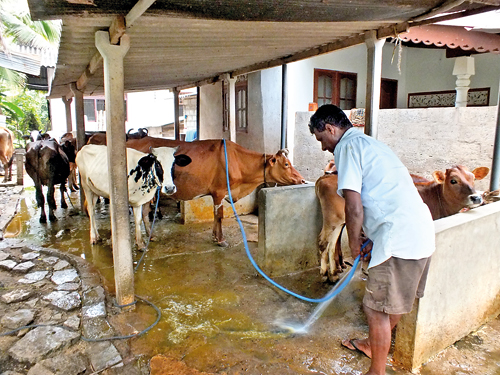Small cattle farmers seek state support

Mr. Shelton Alwis cleans his cattle shed.
His day begins in the wee hours of the morning at 3.30 am, while his working day spans more than 15 hours for almost 365 days.
Muthuwadige Shelton Alwis, now around 55 years and a small scale cattle farmer, has eight milking cows. In an economic sense, he falls into the category of informal entrepreneur, yet is a real hero of our times, though forgotten and ignored.
Mr. Alwis, studied at the Delatura, Ja-Ela Catholic School and after schooling, started his normal life by getting involved in various jobs, working as a security guard, a factory hand and at times even as a labourer. He married and brought up three children, who are all grown-up youngsters including one who is married and living separately.
Mr. Alwis can be considered a successful man since, until he was 40 years, with his earnings from a normal 8am-5pm job he built his own house and attended to all the other things that entail the necessities of life and family needs. If was only after that did he venture to start cattle farming – milk production, which is really extremely hard work as he does not use any machinery or nothing of new technology.
The Business Times last week met him just as he was commencing his daily routine, living at the far end of ‘Nelum Vila’ Mawatha at the edge of the Muthurajawela marshes.
The Muthurajawela marshes are in fact almost entirety reclaimed and people like Mr Alwis are on the verge of getting knocked off due to the so-called development which meticulously eliminates the rural peasantry.
His residence is near the Katunayake-Colombo Expressway. Land is very scarce and he maintains his cattle farm on a tiny patch of not even 13 perches. On a larger portion stands the house, while the cattle shed is squeezed in on the side of the house.
In this small shed there are eight cows and several calves are housed and one could barely move inside the shed. The shed is kept clean and it is a wonder that no foul odour could be found inside the house or outside the neighbourhood. The animals excrete every now and then and the cow dung is removed quickly.
He was seen removing all the cow dung into a wheel-barrow nearby; then washing the entire shed as well the animals. He takes particular care to wash the breast part of the cows. Handy with a bucket he starts milking the cows, while his wife Nirosha Shiromani Kekulawas stands-by to milk the cows alternately.
The milk is put into large number of bottles and containers. The bottles and containers are loaded into his three-wheeler for distribution. In the vehicle he takes a pair of gum-boots and a sickle to cut some grass on his return home to feed the animals.
When he starts his distribution round, already nearly five hours is passed and starts only by about 9 am. He said: “I cover a large area which includes houses and tea kiosks and whatever the balance I sell to a cheese manufacturing factory”.
Averaging around eight bottles per cow, he could obtain about 80 bottles per day. He said that he sells them at the rate of Rs. 130 a bottle. After the sales he comes home after 1 pm, he said. After lunch, he gets back to work, cleaning the shed and cleaning all the utensils.
He collects a large amount of cow dung and as he fights for land space, to dry the cow dung he transports them in his wheelbarrow to a nearby land. He said that once they are dry, a large gunny full of cow dung is sold at the rate of Rs. 375 per bag. He said that animals are taken for grazing to the nearby marshes.
He said that the cattle farm expenditure would be around Rs. 5,000 while his income averaging per month would be around Rs. 50,000. He said that these monies are spent on household needs and no savings is made.
Mr.Alwis said that though he likes to expand his farm, the handicap is enough land and noted that though there appears to be various support for farmers like him, it is not that easy to obtain such assistance.
It is very unfortunate that this small cattle farmer is unable to advance to having a large scale farm with state support and in turn help the country’s fresh milk output. While there are many organised agencies and institutions such as micro financing, they are so institutionalised that farmers like Mr Alwis would never be counted.


